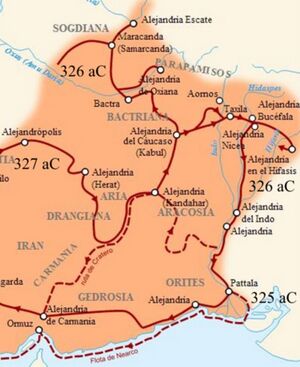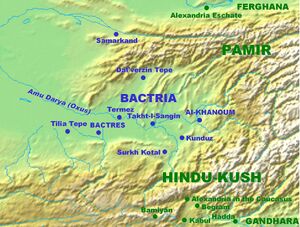Alexandria
| Author:Laxman Burdak, IFS (R) |
- This article is for Alexandria Arachosia (Afghanistan). For other cities of this name see - Alexandria (disambiguation)


Alasanda (अलसन्द) was the Sanskrit name of Alexandria. Alexandria (Arabic: الإسكندرية Hindi: सिकन्दरिया) is a city in Afghanistan.
Variants
- Alexandria (Anabasis by Arrian, p. 141, 142, 143, 197, 206, 210, 247, 266, 340, 351, 416, 420, 423.)
- Alasanda (अलसन्द) (AS, p.43)
- Alexandria (एलेग्जेड्रिया) (AS, p.803) (Arabic: الإسكندرية Hindi: सिकन्दरिया)
Founder
Alexandria founded around a small pharaonic town c. 326 BC by Alexander the Great in Egypt.[1]
Location
Foundation of Alexandria
History
Mention by Pliny
Pliny[2] mentions Adiabene.... The kingdom of the Persians, by which we now understand that of Parthia, is elevated upon the Caucasian chain between two seas, the Persian and the Hyrcanian. To the Greater Armenia, which in the front slopes towards Commagene, is joined Sophene, which lies upon the descent1 on both sides thereof, and next to it is Adiabene, the most advanced frontier of Assyria; a part of which is Arbelitis,2 He alludes to the town of Arbela, where, as it is generally said, the army of Darius was defeated by Alexander the Great; by which engagement the conflict was terminated. It was the fact, however, that Darius left his baggage and treasures at Arbela, while the battle really took place near the village of Gaugamela, about twenty miles to the north-west of Arbela. This place still retains its name of Arbil, where Alexander conquered Darius, and which joins up to Syria. The whole of this country was called Mygdonia by the Macedonians, on account of the resemblance it bore to Mygdonia3 in Europe. Its cities are Alexandria,4 and Antiochia, also called Nisibis5; this last place is distant from Artaxata seven hundred and fifty miles. There was also in former times Ninus6, a most renowned city, on the banks of the Tigris, with an aspect towards the west. Adjoining the other front of Greater Armenia, which runs down towards the Caspian Sea, we find Atropatene7, which is separated from Otene, a region of Armenia, by the river Araxes; Gazæ8 is its chief city, distant from Artaxata four hundred and fifty miles, and the same from Ecbatana in Media, to which country Atropatene belongs.
1 35 See c. 10.
2 He alludes to the town of Arbela, where, as it is generally said, the army of Darius was defeated by Alexander the Great; by which engagement the conflict was terminated. It was the fact, however, that Darius left his baggage and treasures at Arbela, while the battle really took place near the village of Gaugamela, about twenty miles to the north-west of Arbela. This place still retains its name of Arbil.
3 A district in the east of Macedonia, bordering on the Thermaic gulf and the Chalcidic peninsula.
4 Nothing is known of this place. Hardouin suggests that it may have been built on the spot where Alexander defeated Darius.
5 Also known as Antiochia Mygdoniæ, the capital of Mygdonia. Its ruins are still to be seen near a place called Nisibin. It stood on the river Mygdonius, now the Nahral Huali.
6 Or Nineveh, the capital of the great Assyrian monarchy, destroyed by the Medes and Babylonians about B.C. 606.
7 There is great difficulty in ascertaining, from the accounts given by the ancient writers, the exact limits of this district, but it is supposed to have included a considerable portion of the province now known by the name of Azerbaijan. It derived its name from Atropates or Atropes, who was governor of this district under the last Darius.
8 Most probably the place now known as Gazæa, the royal residence of the Parthian kings, and, as its name would imply, their treasure city. Colonel Rawlinson thinks that this place underwent many changes of name according to the rulers who successively occupied it; among other names, it appears to have borne that of Ecbatana.
Mention by Pliny
Pliny[3] mentions Nations situated around the Hyrcanian Sea... Beyond it are the Sogdiani,24 the town of Panda, and, at the very extremity of their territory, Alexandria,25 founded by Alexander the Great. At this spot are the altars which were raised by Hercules and Father Liber, as also by Cyrus, Semiramis, and Alexander; for the expeditions of all these conquerors stopped short at this region, bounded as it is by the river Jaxartes, by the Scythians known as the Silis, and by Alexander and his officers supposed to have been the Tanais. This river was crossed by Demodamas, a general of kings Seleucus and Antiochus, and whose account more particularly we have here followed. He also consecrated certain altars here to Apollo Didymæus.26
24 D'Anville says that there is still the valley of Al Sogd, in Tartary, beyond the Oxus. The district called Sogdiana was probably composed of parts of modern Turkistan and Bokhara. The site of Panda does not appear to be known.
25 It was built on the Jaxartes, to mark the furthest point reached by Alexander in his Scythian expedition. It has been suggested that the modern Kokend may possibly occupy its site.
26 The "twin," of the same birth with Diana.
अलसंद
विजयेन्द्र कुमार माथुर[4] ने लेख किया है....अलसंद (AS, 43) अलक्षेंद्र द्वारा क़ाबुल के निकट बसाए हुए नगर एलेक्ज़ेंड्रिया (सिकंदरिया) का भारतीय नाम है।[5] मिलिंदपन्हो में अलसंद को द्वीप कहा गया है और इसमें स्थित कालसीग्राम नामक स्थान को मिलिन्द अथवा यवनराज मिनेन्डर (दूसरी शती ई. पू.) का जन्मस्थान बताया गया है। पर्शुस्थान की राजधानी हूपियन या वर्तमान ओपियन इसी स्थान पर थी। (न.ला. डे)
In Mahavansa
Mahavansa/Chapter 29 (The Obtaining of the Wherewithal to build the Great Thupa) tells that ....WHEN the wherewithal to build was thus brought together he began the work of the Great Thupa on the full-moon day of the month Vesakha, when the Visakha-constellation had appeared.....When the king, glad at heart, had thus had preparation made upon the spot where the Great Thüpa was to be built, he arranged, on the fourteenth day of the bright half of the month Asalha, an assembly of the brotherhood of the bhikkhus.....
Mahavansa/Chapter 29 tells.... From various (foreign) countries also did many bhikkhus come hither; what need to speak of the coming of the brotherhood living here upon the island?
- With eighty thousand bhikkhus from the region of Rajagaha came the thera Indagutta, the head of a great school.
- From Isipatana came the great thera Dhammasena with twelve thousand bhikkhus to the place of the cetiya.
- With sixty thousand bhikkhus came hither the great thera Piyadassi from the Jetarama-vihara.
- From the Mahavana (monastery) in Vesali came the thera Urubuddharakkhita with eighteen thousand bhikkhus.
- From the Ghositarama in Kosambi came the thera Urudbammarakkhita with thirty `thousand bhikkhus.
- From the Dakkhinagiri in Ujjeni came the thera Urusamgharakkhita with forty thousand ascetics.
- With a hundred and sixty thousand bhikkhus came the thera named Mittinna from the Asokarama in Pupphapura.
- From the Kasmira country came the thera Utinna bringing with him two hundred and eighty thousand bhikkhus.
- The wise Mahadeva came from Pallavabhogga with four hundred and sixty thousand bhikkhus, and
- From Alasanda the city of the Yonas came the thera Yonamahadhammarakkhita with thirty thousand bhikkhus.
- From his dwelling by the road through the Vinjha forest mountains, came the thera Uttara with sixty thousand bhikkhus.
- The great thera Cittagutta came hither from the Bodhimanda-vihara with thirty thousand bhikkhus.
- The great thera Candagutta came hither from the Vanavasa country with eighty thousand ascetics.
- The great thera Suriyagutta came from the great Kelasa-vihara with ninety-six thousand bhikkhus.
Alexander Cunningham[6] has identified Alasanda and Kelasa with mentioned in above paragraph. .... He writes that The passage of Pliny describing the position of Alexandria is prefaced by a few words regarding the town of Cartana, which, while they assign it a similar position at the foot of the Caucasus, seem also to refer it to the immediate vicinity of Alexander's city. .....If I am right in identifying Begram with the Kiu-lu-sa-pang of the Chinese pilgrim, the true name of the place must have been Karsana, as written by Ptolemy, and not Cartana, as noted by Pliny. The same form of the name is also found on a rare coin of Eukratides, with the legend Karisiye nagara, or " city of Karisi" which I have identified with the Kalasi of the Buddhist chronicles, as the birthplace of Raja Milindu. In another passage of the same chronicle, [7] Milindu is said to have been born at Alasanda, or Alexandria, the capital of the Yona, or Greek country. Kalasi must therefore have been either Alexandria itself or some place close to it.
Jat History
- Asiagh: Ram Swarup Joon[8] writes that Pliny has written that during a conflict between KhanKesh, a province in Turkey, and Babylonia, they sent for the Sindhu Jats from Sindh. These soldiers wore cotton uniforms and were experts in naval warfare. On return from Turkey they settled down in Syria. They belonged to Hasti dynasty. Asiagh Jats ruled Alexandria in Egypt. Their title was Asii
- Asii - The country Assyria or Syria derives its name from Asiaghs. The Asiagh people were inhabitants of Asirgarh. One group of them migrated to Europe. Another group moved to Jangladesh. The origin of word Asiagh is from Sanskrit word "Asii" meaning sword. According to Kautilya the people who depended on "Asii" (sword) for their living were known as Asiagh.
- Sindhu - According to Ram Swarup Joon[9], Pliny writes that during a conflict between KhanKesh, a province in Turkey, and Babylonia, they sent for the Sindhu Jats from Sindh. These soldiers wore cotton uniforms and were experts in naval warfare. On return from Turkey they settled down in Syria. They belonged to Hasti dynasty. Asiagh Jats ruled Alexandria in Egypt. Their title was Asii.
- Yona (Jat clan Joon): There is mention of Alasanda the city of the Yonas, in the Mahavansa/Chapter 29. Alexander Cunningham[10] has identified Alasanda with Alexandria.
- Rajendra Singh Lunayach (born 1955) is an Indian Industrialist in Alexandria ranking sixth wealthiest person in Virginia along with his wife Neera Singh in 2006. Their Net worth being $1 billion. The couple, pioneers in the wireless industry, turned their investments into a billion-dollar fortune.
External Links
References
- ↑ Arrian Anabasis Book/5a
- ↑ Natural History by Pliny Book VI/Chapter 16
- ↑ Natural History by Pliny Book VI/Chapter 18
- ↑ Aitihasik Sthanavali by Vijayendra Kumar Mathur, p.43
- ↑ देखें महावंश (गेगर Geiger का अनुवाद) पृ. 194
- ↑ The Ancient Geography of India/Northern India,pp. 26-30
- ↑ Milindu-prasna, quoted by Hardy, in ' Manual of Buddhism,' pp. 440, 516.
- ↑ Ram Sarup Joon: History of the Jats/Chapter III, p.40-41
- ↑ History of the Jats/Chapter III,p.41
- ↑ The Ancient Geography of India/Northern India,pp. 26-30

